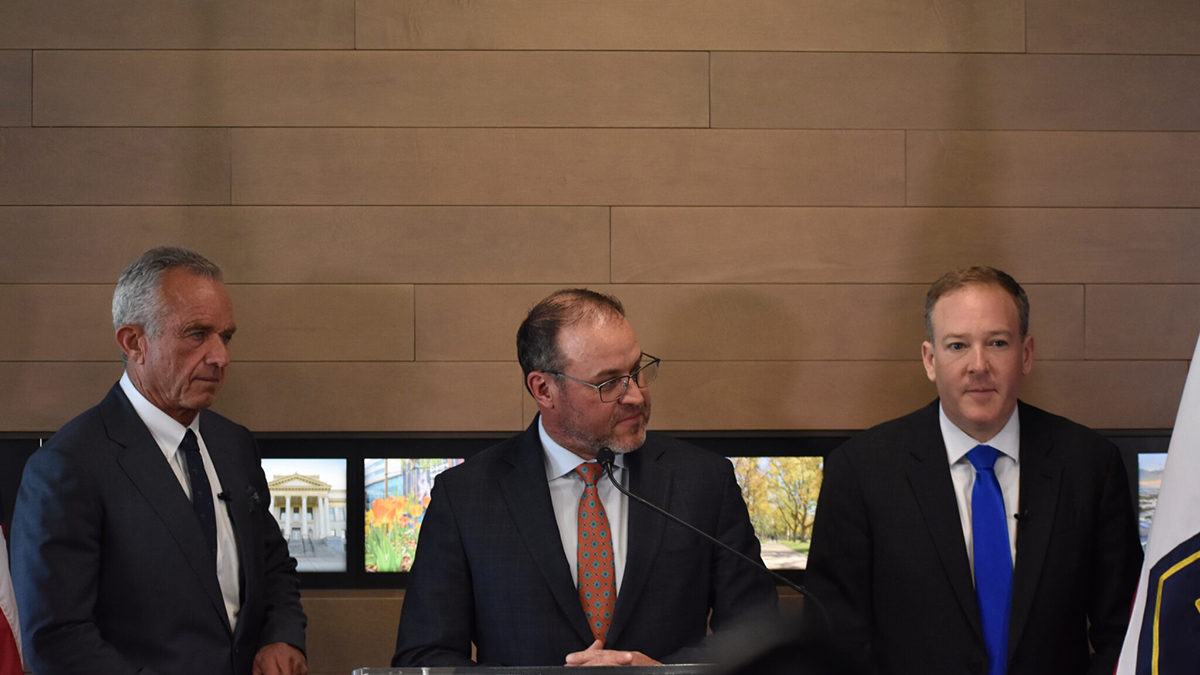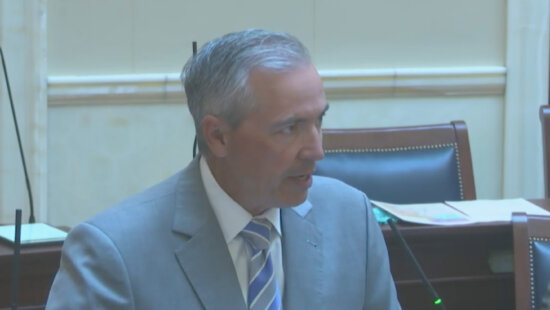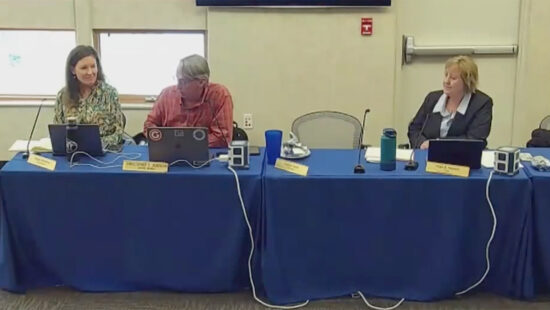Politics
Utah makes bid to cut federal oversight, run its own government

U.S. Health and Human Services Secretary Robert Kennedy Jr. (left) and Environmental Protection Agency Administrator Lee Zeldin (right) listen as Utah House Speaker Mike Schultz, R-Hooper, (center) speaks during an event at the University of Utah on Monday, April 7, 2025. Photo: Kyle Dunphey/Utah News Dispatch
RFK Jr., Zeldin welcomed state leaders to ‘send a list’ of what Utah would like to do, House Speaker Mike Schultz said. ‘We’re going to move very quickly,’ Kennedy told them.
After meeting with President Donald Trump’s Health and Human Services Secretary Robert F. Kennedy Jr. and Environmental Protection Agency Administrator Lee Zeldin, one of Utah’s top legislative leaders said he is “excited” about the prospect of making Utah into a “national experiment.”
During a news conference highlighting Kennedy and Zeldin’s visit to Utah on Monday to applaud a slate of “MAHA” bills the GOP-controlled Utah Legislature recently approved, House Speaker Mike Schultz, R-Hooper, told reporters that during their meetings state and federal officials also talked about the prospect of states taking over the management of a variety of federal programs.
“We’d like to stand as a national experiment, allowing us … the state of Utah, to keep some of its federal dollars and tax dollars and run some programs,” Schultz said.
Utah leaders want the state to be a “pilot project” to “help discontinue the federal oversight” of various federal programs, Schultz said, “whether it’s education, transportation, Medicaid, public health, public lands.”
“We manage more effectively, more efficiently and more affordably than the federal government, certainly, but more so than any other state in the nation,” Schultz said. “Sign us up. Please.”
The House speaker said “the request has been made” to the Trump administration — which has already made moves to shift regulatory power to the states, most recently with his executive order to dismantle the U.S. Education Department.
“I’ve been so excited to hear the response back from both” Kennedy and Zeldin, Schultz said.
When asked about Schultz’s comments, Kennedy told reporters the Trump administration welcomed the idea.
“President Trump’s vision for this country is that the states should be 50 laboratories around the country, that they should be able to run their own affairs and the best ideas … are coming from the bottom up,” Kennedy said. “We are determined to do that, and we’re talking about doing it already, and we’re going to move very quickly.”
Trump administration to Utah: ‘Get us a list’ of what Utah wants
In an interview with Utah News Dispatch on Tuesday, Schultz shared more details about his meetings with the top Trump administration officials, as well as what he hopes will come of them.
“Such a huge day for the state of Utah and certainly for me and some of the things I’ve been pushing,” Schultz said.
He pointed to his speech on the opening day of the 2025 Utah Legislature, when he issued a rallying cry for Utah to wrest control of public lands away from the federal government — something Utah’s GOP is more optimistic about than ever given Trump’s election.
During that speech, Schultz shared the same words as he did Monday: “We’d like to petition the federal government to allow Utah to stand as a national experiment, allowing us to keep a portion of our federal tax dollars, run the programs, and discontinue federal oversight.”
“To our federal delegation, I have three words: Sign. Us. Up,” Schultz said at the time, claiming as he did this week that the state can better manage education, transportation, Medicaid and public lands
Schultz said the meetings with Kennedy and Zeldin “couldn’t have (gone) better.”
“I mean, it was just like, ‘Absolutely, that’s one of the directives from Trump, giving states more autonomy to deal with their affairs, pushing states can do it better than the federal government can,” Schultz said. “They talked about Utah and how we’ve led the nation on so many fronts, how we’re better managed. So they are very open to it.”
Schultz said their response was “get us a list of the things you want us to look at and focus on.” So now, the speaker said he plans to work with Gov. Spencer Cox’s administration, Senate President Stuart Adams, R-Layton, and other state agencies to “see what we can come up with.”
Adams, in a prepared statement issued Tuesday, focused his comments on paving the way for Utah’s future, especially when it comes to energy production and “independence.” He said “it was great to sit down” with Kennedy and Zeldin to “discuss Utah’s efforts to become an energy hub and how we’re working to build a brighter, healthier future for our children and communities.”
“Our state and nation need more energy, and Utah is uniquely positioned to lead the charge toward energy independence,” Adams said. “With its abundant resources and innovative spirit, Utah is ready to help ensure a future with reliable, safe and affordable energy. America must become the AI capital of the world because the nation that leads in AI will shape the future — driving economic growth, military power and global peace.”
How would Utah gain more autonomy?
Ideally, Schultz said he’d like Utah’s federal funding to come in the form of “block grants” that would let the state, rather than federal officials, manage the programs.
“Heck, we’ll do it cheaper,” Schultz said. “Block grant us the money that you’re spending, and, you know, even reduce it 10%, 15%, 20%, or whatever that money is, we’ll have to look at it. But we can do it so much cheaper, so much more efficient and more effective and affordable here in the state of Utah.”
It’s not yet clear to what extent Utah could take control over federal dollars and programming. Schultz acknowledged there could be limits on what the president or his administration could do without facing lawsuits or other hurdles.
“There’s some things that Congress has probably given enough authority to the EPA, HHS, and transportation, to make those determinations,” Schultz said. “And then there’s some that probably can’t happen.”
However, Schultz said that if necessary, Utah state leaders will be ready to convene a special session to take action.
“It’s a priority for myself, President Adams, and Gov. Cox,” Schultz said. “We will come into a special session and make changes necessary on the state side, set policies, to do this.”
Schultz pointed to Utah’s Department of Environmental Quality, which answers to the EPA, and said that Utah already has more “autonomy” than other states.
“Here we run a lot of the programs at the state level with guidance from the EPA, instead of having the EPA run those. And so we’re going to look to expand those,” Schultz said. “What can the states take over? What will the EPA give to the states, specifically to Utah?”
Monday’s meetings could ultimately save Utah taxpayers “hundreds of millions of dollars, if not billions,” Schultz said. He claimed that if the federal government turns more control over to Utah and if the federal government cuts down on regulations, especially for transportation and permitting within the EPA, it will result in massive cost savings.
‘Hands off’ protests
Over the weekend, thousands of Utahns joined the worldwide “Hands Off” protest against Trump and Elon Musk. They protested against Department of Government Efficiency cuts that have targeted services, federal workers’ jobs, and more.
Schultz acknowledged that in the early months of Trump’s return to the White House, his aggressive actions have resulted in some chaos — but he said “most of that has walked backwards, so the chaos isn’t happening anymore. They’ll be more strategic, they’ll be more thoughtful around some of those things.”
Schultz also defended Trump embracing Musk and DOGE, arguing the federal government’s spending has been “unsustainable.”
“These are things that needed to happen for decades,” he said, adding that “Trump was very transparent in what he was going to do before he was elected. And people elected Trump on the fact that he was going to put Elon in charge of helping reduce government expenses, go look for corruption, go look for efficiencies. … Those are all good things.”
Utah, however, has been hit by painful federal layoffs, including the loss of dozens of public health workers in state and local health departments. Though he said those layoffs were of “temporary employees,” Schultz also acknowledged that the timing of the announcement that Trump would be cutting COVID-19 funds short was sudden.
“Having a little bit of time to work through it would have been much better, and we did talk about that with (Kennedy),” Schultz said. “Having even 30 days or two weeks heads up … would have been much better. But you know, we’ll find a way through it.”
He also acknowledged that some cuts targeted mental health funding, “and we have a shortage of mental health workers in the state of Utah.”
Still, while “layoffs are tough and never easy,” Schultz also defended the moves as necessary to tamp down on federal spending.
“It’s unsustainable,” Schultz said. “So something needs to be done, and it’s something the majority of Americans agree with.”
Written by Katie McKellar for Utah News Dispatch with Kyle Dunphey contributing


















